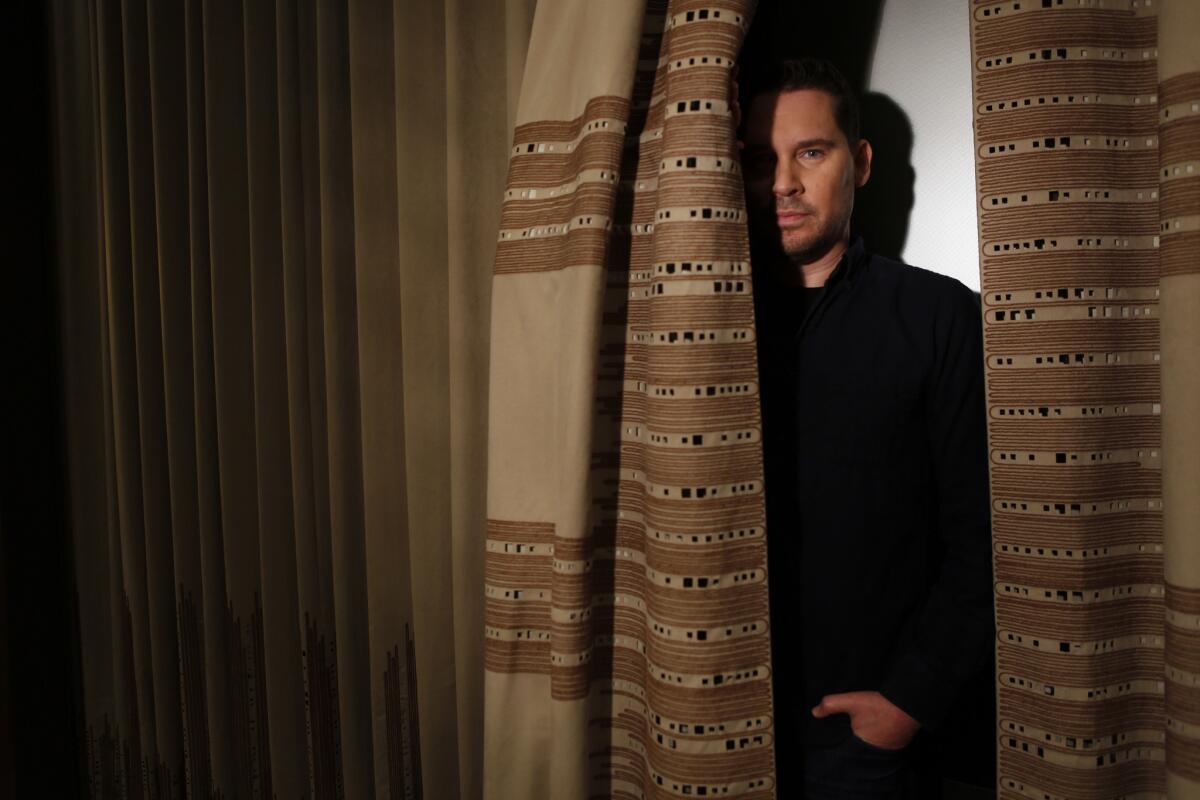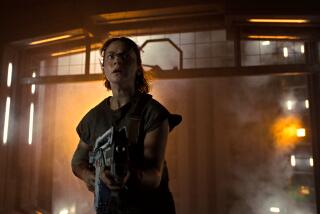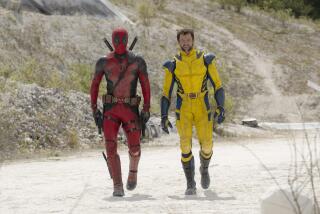For ‘X-Men: Apocalypse,’ think Old Testament, wrath-of-God-like stuff
One night a few years ago, director Bryan Singer was at the Saddle Ranch Chop House in Los Angeles, half-drunk, having a good time when a dark cinematic vision popped into his head.
“I was with a bunch of friends, buzzed, eating chicken wings,” Singer recalled on a recent afternoon as he sat in an edit bay on the 20th Century Fox lot. “Suddenly, I was like, ‘How about you see a boy and you don’t know what he’s doing — and then we reveal that he’s building a giant pyramid effortlessly, and nearby on a sand dune are four men on horses?’”
That first glimpse of the “X-Men” franchise’s next villain — an ultra-powerful mutant with a god complex known as Apocalypse, first introduced in the comics in 1986 — would ultimately become the post-credits tag at the end of 2014’s “X-Men: Days of Future Past,” which went on to gross nearly $750 million worldwide. Now the fearsome, hulking villain will get his full turn in the spotlight in “X-Men: Apocalypse,” which hits theaters May 27.

The ninth installment in the long-running comic-book franchise (counting such spinoffs as February’s smash “Deadpool”), the film kicks off with the cult leader-like Apocalypse (played by Oscar Isaac), who was worshipped as a god in ancient times, awakening in 1983 after centuries of being dormant. Angered by the state of the world, he seduces four mutants, including Magneto (Michael Fassbender), to help him wipe out civilization and usher in a new order. Enter Charles Xavier (James McAvoy), Raven (Jennifer Lawrence) and a team of young mutants to help save humankind.
“Apocalypse views himself not as a mutant but as a god — and, for all intents and purposes, he is potentially the God of the Old Testament,” Singer said. “After being buried for 4,000 years, he awakens to a society that has become interconnected and developed hubris. Humans have created nuclear weapons and assumed godlike proportions in the buildings they build and the things they create. So he sets about to eradicate those things and build what he considers a cleaner, purer world.”
Apocalypse views himself not as a mutant but as a god -- and, for all intents and purposes, he is potentially the God of the Old Testament.
— Bryan Singer, director
If there were a Guinness world record for most superhero movies directed by one person, Singer, 50, would hold it. “Apocalypse” marks the fourth “X-Men” film he has helmed since launching the franchise 16 years ago, and he also directed 2006’s “Superman Returns.” No one seems more surprised by this turn of events than Singer himself.
Having burst to fame with 1995’s “The Usual Suspects,” Singer had no clue he would become so deeply enmeshed in the comic-book world when he directed 2000’s “X-Men.” “No .... way,” he said, laughing. “I never even read comics when I was a kid. I was an old ‘Star Trek’ fan. I just knew I wanted to work in the sci-fi fantasy space.”
But the more deeply he delved into Marvel Comics’ expansive and complex world of mutant superheroes, the more he connected personally with it. “I grew up a Jewish kid in a Catholic neighborhood, I was an only child, I was a nerd in school, I was struggling with sexuality issues — all sorts of things were happening,” he said. “So when I suddenly come across this universe that’s all about misfits and outcasts who become superheroes, it intrigued me.”
After the huge success of “Days of Future Past,” which brought together both older X-Men cast members and their younger counterparts in a twisty time-travel story, the film’s key players, including Singer, writer and producer Simon Kinberg and producer Hutch Parker, knew they needed to aim for something even larger in scope for the next film.
“‘Days of Future Past’ was the most ambitious ‘X-Men’ movie to date,” Parker said. “That table being set, the natural next conversation was, ‘Where could we find a new and greater challenge for our X-Men?”

Director Bryan Singer’s latest mutant adventure is “X-Men: Apocalypse.”
That conversation led quickly to Apocalypse. “We hadn’t ever done anything like an extinction-level, global-scale threat in these movies,” Kinberg said. “It also felt interesting to be able to create a new villain that would be more powerful than Magneto and would turn Magneto, who’s been this messianic leader, into a follower. Those were the initial sparks.”
Alongside returning cast members such as Fassbender, McAvoy and Lawrence are a large number of newcomers to the franchise, including Olivia Munn (Psylocke), Kodi Smit-McPhee (Nightcrawler) and “Game of Thrones” star Sophie Turner, who plays the telepathic and telekinetic fan favorite Jean Grey, an older version of whom was played in previous movies by Famke Janssen.
“This Jean is different,” Turner said of the younger iteration she introduces in “Apocalypse.” “She has no idea how to control her powers. She’s too strong for her own good. She’s very vulnerable and alienated, and she just wants to be like a normal teenager.”
To help flesh out the character of Apocalypse, Isaac, who grew up in a devoutly Christian home, locked into the idea of highlighting the character’s biblical underpinnings. “I’d kind of gotten obsessed with the Book of Revelations just because it’s so hallucinogenic and trippy and scary, and I thought it would be fun to really go into that language,” said the actor, who also researched cult leaders to understand their powers of persuasion. “That was part of the process that I really enjoyed: coming up with a sound philosophy for the villain to have, something that was a little more specific and nuanced than just destruction.”
To some, talk of religion and cultism may sound like dark, heady stuff for a superhero movie; indeed, many critics and fans have knocked “Batman v Superman: Dawn of Justice” for being excessively grim and overly freighted with philosophical speeches. But Kinberg says it’s in keeping with the established tone of the X-Men films: “What’s different about the X-Men movies is that they’re operatic. They’re Shakespearean movies. A lot of superhero movies now, including ones I love, are wittier and more contemporary in their feel. But X-Men is more theatrical.”
What’s different about the X-Men movies is that they’re operatic. They’re Shakespearean movies.”
— Simon Kinberg, writer and producer
Still, for all its weighty ideas and world-destroying spectacle, Singer says “Apocalypse,” like all of the X-Men films, is ultimately about more intimate concerns. “Our movie is all about our characters,” he said. “I mean, yes, there is the big stuff — this film has more spectacle than any other X-Men film has had, probably by many times. But it’s not the focus. Ethan Hawke once said to me many years ago, ‘Actors equal production value.’ I’ll never forget that.”
MORE SUMMER MOVIES:
Our complete summer movie guide >
Every single movie coming out this summer >
5 horror movies to spike your adrenaline >
Fan favorites like ‘Ghostbusters,’ ‘Star Trek’ and ‘Tarzan’ crash the superhero party >
Ryan Gosling, Meryl Streep, and ‘Swiss Army Man’ lead the counterprogramming charge >
More to Read
Only good movies
Get the Indie Focus newsletter, Mark Olsen's weekly guide to the world of cinema.
You may occasionally receive promotional content from the Los Angeles Times.











